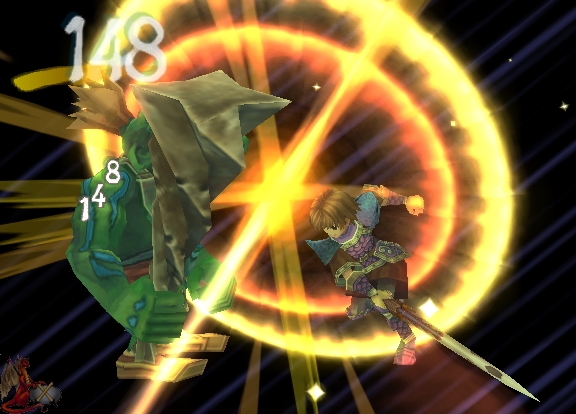|
|

|
BATTLE SYSTEM
|

|
INTERACTION
|

|
ORIGINALITY
|

|
STORY
|

|
MUSIC & SOUND
|

|
VISUALS
|

|
CHALLENGE
|
Easy/Moderate
|
COMPLETION TIME
|
30-80 Hours
|
|
OVERALL
3.5/5
|
Rating definitions
|
|
|
Enter the world of Radiata, where heroic knights fight epic battles to defend their maiden of honor... At least that's the way it would be, if not for a cast of smart-talking, quirky, irreverent characters and a slew of comical RPG mold-breaking moments. Radiata Stories for PS2 represents a break from Square-Enix's more traditional games with clever humor, a simplified battle system and overall decent scenery.
Players begin the game as Jack Russell, who reluctantly tries out for the Radiata Knights after some nudging from his sister Adell. After being bested in the first round of tryouts, he somehow manages to become a knight anyway, and a fairly open-ended story ensues. The plot is nothing players haven't seen before, but is well-executed and accomplishes its goal. The story is light-hearted and humorous for most of the game, but takes a more serious turn about halfway through. Main themes include RPG staples like friendship and respect, and less typical themes like nationalism, racial unity, and the dangers of excessive pride.
 Perform powerful Volty Blast attacks
Perform powerful Volty Blast attacks
|
|
Aside from its light-hearted humor, Radiata Stories is defined by its solid music and art direction. Music matches the atmosphere every time, from the child-like music of the goblin cities, to the down-to-earth feel of the elves and the go-to-work mining-type music of the dwarves. The music in Radiata City itself is fun and busy - from the moment you hit town, you know Radiata is a city that never sleeps.
Each of the games's 177 recruitable characters has his or her own schedule, and specific requirements in order to recruit them. The best characters may have very complex recruiting requirements. In addition, the game requires more than one playthrough in order to recruit them all. The unique personalities of each of the characters truly separates them from each other, and the game complements this with further development through a character database called a Friend List.
Battles are generally quick, fun and engaging. Don't expect eye-popping visual candy, but graphics in the game accomplish their goal fairly well. The game does away with overly-complicated menu juggling, and instead allows players to control party members using only one or two menus. What ensues is an enjoyable hack-and-slash fest unencumbered by a complex menu system.
 Enjoy the humorous dialogue
Enjoy the humorous dialogue
|
|
Though players cannot control the individual movements of party members other than the hero, each party member can be controlled by issuing commands. Some of these include baiting the enemy, healing weak party members or performing an attack from the Volty Gauge.
The Volty Gauge is charged with each hit a player lands on an enemy, allowing him or her to perform several semi-powerful attacks, or one very powerful attack. Players can also use the gauge to form links with party members, each with specific benefits like healing or increasing damage. Weapons in the game are limited to one-handed swords, two-handed swords, axes and spears. Each weapon group has its own set of skills players can use to throw an enemy off balance or break parry.
Outside of battle, your time is mainly occupied by recruiting, learning skills from training dummies, taking non-plot missions and interacting with various denizens of the game. Menus are quick-loading and easy to navigate, with no lagging whatsoever. Loading times are slim between different areas in the game; a nice feature, considering the game uses many static camera perspectives as the character moves from one screen to the next. Although not a problem in the city, the lack of camera control can be bothersome in areas with monsters since players often can't see what's ahead of them.
Graphics are a mixed bag. Players will generally appreciate overall design and complexity over one or two exceptional visuals. For example, most of the space between destinations in Radiata is nothing you'd want to stare at all day. Some of the monotony is reduced once you can access Journey Pigs, which are teleportation totems near major destinations in the game. Still, not all areas feature these totems, so players will still have to suffer some monotony when recruiting or finding rare items.
The game's difficulty level is generally easy. Even when doing the extra dungeons available by defeating the last boss, players face little difficulty. The only exceptions are occassional spikes in difficulty when facing some bosses, or when practicing against training dummies to improve weapon skills.
One of the nice things about Radiata Stories is its replay possibilities. Players can finish the game once and not look back, or enjoy a second playthrough with added backstory after taking the other side of a major split in the plot mid-game. Players retain money, weapon skills, some items and their Friend List in the new playthrough, but not character levels, weapons, armor or recruited chracters. Yikes!
Overall, with a decent plot, quick battles and a diverse cast of characters, Radiata Stories is a good game, and worthy of a long rent if not a buy. Slight monotony and camera issues might bog down the gamer from time to time, but are soon forgotten as players experience the diverse world of Radiata.
Review Archives
|









